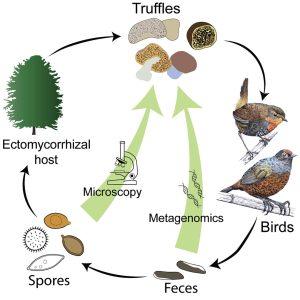When it comes to conducting research that has high impact, Dr. Ann Wilkie has a distinctive skill set that leads to her participation in many interdisciplinary studies. For the second time in three years, Wilkie is a co-author on research the UF/IFAS Dean for Research Office considers “high impact.” The most recent honor for the research professor of bioenergy and sustainable technology in the Department of Soil, Water, and Ecosystem Sciences (SWES) involves South American birds and fungi in a study that reveals the importance of native bird species in spore dispersal.
For “Discovering the role of Patagonian birds in the dispersal of truffles and other mycorrhizal fungi,” published in Current Biology, Wilkie worked with Dr. Matthew Smith in the Department of Plant Pathology. The study was part of lead author Marcos Caiafa’s dissertation research. For her part, Wilkie drew on her experience as a microbiologist to design the epifluorescence microscopy protocols and developed the staining technique used in the study to examine representative fecal samples and estimate the fungal spore load and spore viability.
“This was such an interesting research project to work on,” Wilkie said. “I was pleased to contribute my knowledge toward a protocol for analyzing the samples and interpreting the results.”

This high-impact research explored the role of two native Patagonian birds, chucao tapaculos (Scelorchilus rubecula) and black-throated huet-huets (Pteroptochos tarnii), in the dispersal of plant-symbiotic mycorrhizal fungi. These birds concentrate their activity on the forest floor, scratching the ground like pheasants. The study used metagenomic analyses of fecal samples to show that the two endemic bird species consume a wide diversity of truffles and other mycorrhizal fungi that are symbiotically associated with Nothofagaceae (southern beech) trees that dominate Patagonian forests.
Epifluorescence microscopy of fecal samples indicates that a high proportion of fungal spores remain viable after passage through the birds’ digestive systems. The role of mammals in fungal spore dispersal is well documented, but the relevance of birds as dispersal agents of fungi has been understudied, despite the prominence of birds as seed dispersal vectors across the globe.
The results show that fungi are a common food for both chucao tapaculos and black-throated huet-huets. Also, this animal-fungi symbiosis is widespread and ecologically important in Patagonia (with samples spanning more than 700 km across southern Chile). Evidence suggests that the birds are particularly important for the more than 45 species of truffles (enclosed fungi that fruit mostly belowground) that were detected in bird fecal samples, since those fungi are not capable of dispersing their spores via wind and therefore rely on animals to spread their spores. This research is important because it shows that birds may replace mammals as the principal vectors for the dissemination of fungal spores in certain habitats – a new and surprising finding that amounts to a paradigm shift in our understanding of bird-fungi interactions.
“This study is the first conclusive evidence for truffle dispersal by birds,” Wilkie said. “This has wide implications for the study of animal-fungal symbioses.”
“This is another well-earned honor for Ann,” said Dr. Matt Whiles, professor and chair of SWES. “She has an exceptional ability to investigate diverse topics and is a much sought-after collaborator because of her unique talents. I am particularly excited about this paper because it showcases the variety of research we do as a department that spans so many ecosystems.”
The high-impact research is one of ten receiving special recognition out of more than 2,000 published articles from UF/IFAS academic departments. the UF/IFAS Dean for Research Office honored awardees at a ceremony in early May. You can read the research article here: https://www.sciencedirect.com/science/article/pii/S0960982221014135
 1
1
